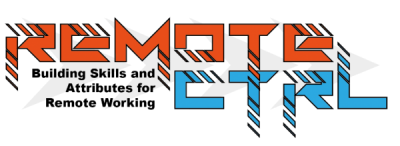REMOTE CTRL - Building Skills and Attributes for Remote Working
Project duration: 01.11.2020 - 31.10.2022
Project Reference: 2020-1-UK01-KA202-079004
Programme: Erasmus+, Cooperation for innovation and the exchange of good practices in the field of vocational education and training
Coordinator: Small Firms Enterprise Development Initiative Limited
Website: https://remotectrl.eu/
Summary
“When we have all the answers, the questions change”. Not within recent history, has this quote been more pertinent than it is now. At the time of writing this application, COVID-19 is our new reality. It is ravaging global health services; forcing global citizens into lock-down; seen business, schools, universities, and the majority of public services close their doors, with some in both the public and private sectors remaining closed indefinitely. Across Europe, as well as these issues we have seen a ban on non-essential travel, as COVID-19 calls into question the ideals of open borders and the free movement of people, amongst other emblems of the European vision. The level of economic downturn and the surge in unemployment figures are unprecedented. Experts estimate that an economic depression, akin to the Great Depression of the 1930s, is around the corner; as society has been shut so too has our economy and we do not know how or when it will recover. “When we have all the answers, the questions change”. Just as we were beginning to see the progress from our economic recovery following the crisis in 2008; now we find ourselves with the need to plan a new economic recovery; but this time in a very changed world.
Remote working is not just a topic that has emerged because of COVID-19; but the pandemic has brought into focus the potential for more employees to work remotely; and has also given insight into the personal, economic and environmental benefits work pursuing remote working policies. In terms of the personal benefits of remote working to employees, 77% of people say that working from home has improved their overall health and wellbeing (FlexJobs, 2018). This is supported by statistics which show that workplace stress and anxiety in the UK alone, cause a loss of 15.4 million staff days each year (UK HSE, 2018). It is no wonder then, that 20% of people would be willing to take a pay-cut of more than 10% in order to work remotely (Owl Labs, 2019); and 21% of people stating that they would do away with annual leave days, to be able to work remotely at least part-time (FlexJobs, 2018). Studies have also shown that employee productivity increases with remote working, on average by working 1.4 more days every month, resulting in more than 3 additional weeks of work per year, per employee. In a survey of 7,000 workers, 65% felt they were more productive in remote working environments due to reduction in stress from commuting, fewer interruptions from fellow employees and even a break from "office drama" (Owl Labs, 2019).
Remote working is the labour market model of the future. By 2025, 75% of the workforce will be made up of Millennials and Generation Z employees; both of which are more environmentally aware and are committed to saving the planet and both of which also prefer flexible working patterns. In order to attract the top talent from this next generation of employees, employers will have to be willing to accommodate remote working or flexible working patterns. Remote working provides many benefits to employers, employees, governments and society in general. However, in order to be adopted en-masse so that it can support our economic and environmental recovery, it needs to be supported by tailored education and training materials that will build key skills and competences in employers and employees so that they can adapt to remote working. The REMOTE CTRL project aims to develop bespoke training resources that will address the needs of employers, employees and VET tutors in a remote working environment.
The REMOTE CTRL project proposes the following outputs to reach these objectives:
(1) REMOTE CTRL Masterclasses and Manual for Employers – comprising a comprehensive training programme that will be delivered through a series of time-bound master-class sessions to support managers to adapt their management style for a remote working environment.
(2) REMOTE CONTROL Toolkit for Employees - aims to develop the remote working literacies of employees so that they can manage successful remote careers.
(3) In Service Training Programme for VET Tutors – this programme will support VET tutors to get the most out of both the toolkits, thus, providing support to employers during their remote working journey.
(4) MOOC - The MOOC will house all of the materials created during the lifetime of the project under the one roof. It will be free for anyone to use, and can be accessed remotely, from anywhere in the world. The MOOC will be fully optimised across all devices and platforms.
(5) Policy Recommendations Report - The consortium is aware that the model proposed in this project has the potential to yield significant policy-learning across the participant countries. As such, a policy paper will be key publication at the end of this project to allow partners to reflect on the lessons learned, to make policy recommendations and influence labour market and VET policy on a national and European level.
Project partners:
- FUTURE IN PERSPECTIVE LIMITED (IE) ,
- IHKPROJEKTGESELLSCHAFT MBH (DE) ,
- Rightchallenge - Associação (PT) ,
- INNOVENTUM OY (FI) ,
- UNIVERSITY OF PELOPONNESE (EL) ,
- UNIVERSITATEA DIN PITESTI (RO) ,
- WYZSZA SZKOLA BIZNESU I
NAUK O ZDROWIU (PL)
How to contact us?
Institutional project coordinator: j.komorek@wsbinoz.pl


